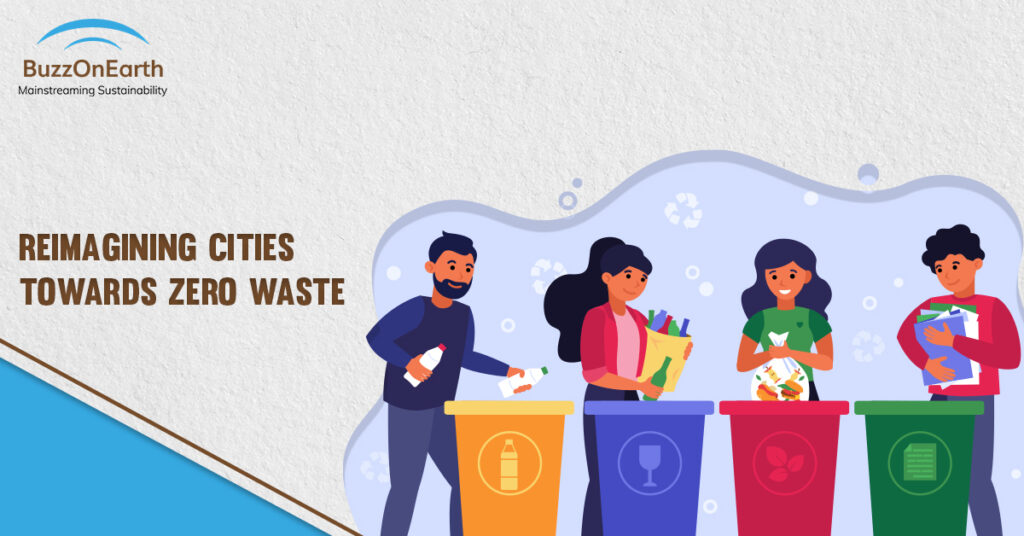Introduction
COVID-19 has not only strained our cities’ health infrastructure, but the epidemic has contributed to our waste management difficulties. The increased usage of personal protective equipment (PPE) such as disposable masks, safety kits with cleaning supplies, alcohol-based sanitisers, and the purchase and consumption of canned and packaged foods has resulted in tonnes of additional trash, most of which is dangerous. However, it will also increase the demand for efficient, resource-efficient, round, and inclusive techniques in our cities. Municipalities may begin to reduce the cost of waste management by transitioning to zero waste solutions and take essential moves toward rethinking and reinvesting in trash management. But how can cities implement the zero-waste concept? Here, we discuss how cities are adopting zero waste and contributing to resource management.
How are Cities adopting zero waste and moving resource management ?
To begin, make isolation mandatory rather than optional. According to the 2016 Solid Trash Management Rules, each producer must separate waste into three categories: wet (biodegradable), dry (non-biodegradable), and household hazardous waste. Price incentives can be examined as a significant motivator of mainstream segregation and focus on waste reduction at the source. For example, in nations such as Sweden and South Korea, excessive trash creation is discouraged by charging residents a higher user charge than those who create less garbage. Outstanding efforts, such as the one being implemented in Mangaluru, might also be investigated. There is a 50% property tax reduction for homes that separate and compost their garbage, and mixed rubbish is not collected. These initiatives must be supplemented with ongoing lobbying and education, such as focusing on ward level committees that monitor and manage segregation at the source. Creating a segregation incentive scheme will enable optimum recovery of wet and dry trash and ensure that as little garbage as possible ends up in landfills.
Second, effective collection and transportation (C&T) systems must be established to enable segregation from start to finish, from collection to processing to disposal. This will aid in the reduction of resource contamination and the development of systems that will ensure better resource management. Additionally, boosting collection efficiency in cities through route optimisation will aid in the conservation of resources like gasoline. A strong Management Information System (MIS) to improve accountability and transparency, as well as to get statistics on the proportion of trash that is sorted, collected, and processed
Create mechanisms in cities to maximise resource recovery. Change the infrastructure to enable maximum resource recovery with a phase-out plan from relying on disposal infrastructures such as landfills or incinerators following the new paradigm. Create decentralised infrastructure wherever possible to decrease C&T expenses, as cities that have transitioned to decentralised systems, for example, have seen long-term savings of over 50% in C&T. Furthermore, communities may encourage households and bulk producers to treat wet waste at the source. They may explore developing systems of subsidies and incentives to adopt decentralised technologies such as biomethanisation and composting.
Composting offers a large unmet potential for reducing and upcycling trash into fertilisers. Composting as a service can be given in cities; for example, StoneSoup, a Bengaluru-based firm, offers home composting to homes for a monthly fee. Create compost market connections as well. Set up a system for collecting compost and distributing vouchers utilised at all Milk Booths/Grocery counters or similar locations. This approach may be tested in a few RWAs/societies in each local authority. Additionally, urban local governments can publish a list of local suppliers and technology available for effective resource management on their website, making information easily accessible.
Including the informal sector ensures further sorting into fractions and the establishment of recovery infrastructure for dry trash. Panaji, Goa, for example, launched the ‘Shop with your waste campaign,’ in which households can barter their clean, dry waste for grocery items from designated shops, the shopkeeper is further incentivized by the recycler, and the recycler receives a clean dry stream to process further- a win scenario for all. Impose a landfill/incineration fee per tonne of trash disposed of/incinerated to minimise reliance on land and disincentive dumping and waste incineration. Tipping fees must be connected to the quantity of garbage given to the concessionaire/operator and the practical and frequent collection of segregated waste.
In our cities, the informal sector is the true resource manager. One approach would be to incorporate trash pickers directly into the waste collection at the source, with a right over recyclables and a guarantee of frequent waste access, and to include this in city SWM bylaws. Another preferable alternative would be to form cooperatives or societies with them; municipalities may also assist the informal sector in creating cooperatives or SMEs. Finally, give them the training to help them develop their upcycling initiatives to be integrated into privately managed facilities.
Awareness and social engineering must be ongoing rather than occasional. Various campaigns and programmes have been launched as part of the Swachh Bharat Mission and state-led initiatives; nevertheless, additional communication efforts are required to alter behaviour at the grassroots level. Resident/RWA committees can help to ensure public commitment to trash segregation. It is also critical to educate garbage collectors so that they do not combine waste. By publicising success stories of interventions, the media may play an essential role in raising awareness. Combining city-specific local sanitation and solid waste management bylaws with a zero-waste plan encompassing different measures that will aid in the city’s transformation into a zero-waste city Evidence and the local context must be used to justify the regulations. Cities must conduct data incentivisation and waste characterisation studies to estimate the existing quantities of trash, which will aid in the development of a practical and implementable zero waste plan for the city and lead to efficient resource management.
Conclusion
Cities are committed to becoming zero waste. This will allow urban local governments to demonstrate their leadership and willingness to address the existential threat that climate change poses by assisting in maximum resource recovery, empowering livelihoods, and making resource management wealth-generating.

